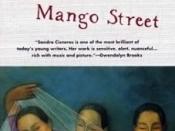The House on Mango Street
In the novel "The House on Mango Street" Sandra Cisneros records a series of impressions and significant moments in the life of a young girl named Esperanza. This novel covers a year in her life, a year in which her family moves into a rented house on Mango Street. It follows her and a group of her friends and neighbors as they confront issues of sexuality, domestic violence, death, creativity, friendship, and racism. In the end, Esperanza realizes that, while she may leave Mango Street someday, she will always be obligated to come back to help those who aren't able to leave. "The power of this novel lies not only in the story of Esperanza, a worldly yet naive Latino girl struggling to grow up in Chicago's poverty-stricken south side, but also in the fresh, poetic and very imaginative language employed" (Poppleton). With this, Cisneros brings forth her theme: that even in oppressive surroundings, one can rise up past borders and achieve independence.
In the book, women are looked upon as objects by men whether they are boyfriends, friends, fathers, or husbands. The girls in the neighborhood grow up with the mentality that looks and appearance are the most important attributes to a woman. Cisneros also shows how Latino women are expected to be loyal to their husbands, and that a husband should have complete control of the relationship. Yet on the other hand, Cisneros describes the character Esperanza as being different. Even though she is born and raised in the same culture as the women around her, she is not happy with it and knows that someday she will break free from its ties. She comes back through her stories by showing that women can be independent and live their own lives
In the...


